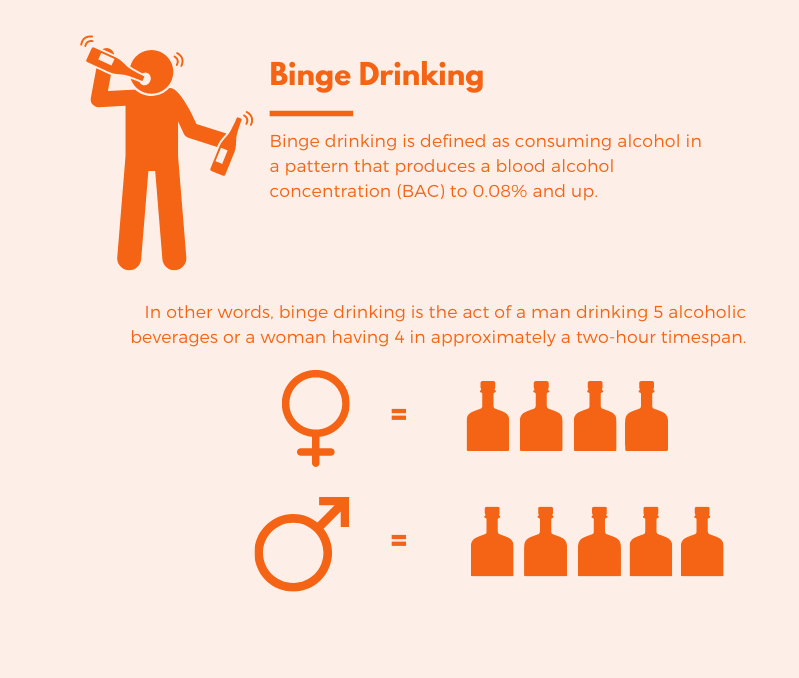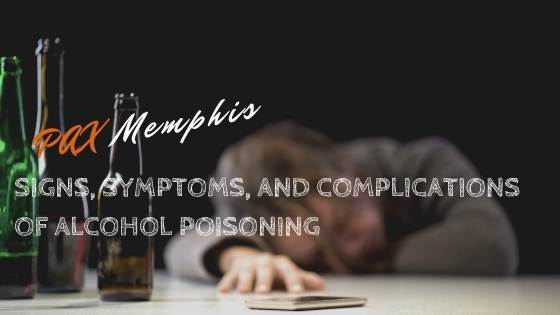According to the CDC, an average of 6 people die each day of alcohol poisoning in the United States. This mounts to 2,200 preventable deaths each year. Alcohol dependence or alcoholism is thought to be a contributing factor in up to 30% of these deaths.[1]
Drinking more than suggested in a short period of time, drinking to the point that the liver becomes damaged, or battling alcoholism can increase the risk of alcohol poisoning.
How Does Alcohol Poisoning Happen?
When people drink alcohol, it is filtered through their blood and into the liver. The liver can only process so much alcohol at once, so drinking too much too quickly overwhelms the system and leads to intoxication.
People who are intoxicated may exhibit signs like poor decision-making, lack of motor coordination, and increased sociability. However, if a person continues to drink without giving their liver a chance to catch up, they could become significantly impaired and suffer from alcohol toxicity.
Alcohol is a depressant that slows down the central nervous system, affecting several vital bodily functions such as heart rate and breathing. When too much alcohol builds up in the blood, an overdose or poisoning occurs, causing certain parts of the brain to shut down.[2]
A leading cause of alcohol poisoning is binge drinking. Binge drinking is defined as a pattern of heavy drinking where a woman consumes more than four drinks in two hours or a man consumes more than five drinks within two hours.[3]
One drink equals 12 ounces of beer, 5 ounces of wine, or 1.5 ounces of hard liquor. Drinking more than 4-5 drinks in a two-hour time span can cause the liver to fall behind in processing alcohol, causing too much of it to build up in the bloodstream.

Risk Factors
Aside from binge drinking, there are several other factors that can increase a person’s risk of alcohol overdose. These include:
- Height and weight
- What the person ate that day
- If they consumed alcohol in combination with other drugs
- The percentage of alcohol contained in drinks
- The person’s tolerance level
- Overall health and metabolism
Symptoms of Alcohol Poisoning
The more a person drinks over a short period of time, the more likely they are to consume too much alcohol. This is worrisome because alcohol can take between 15-30 minutes to take effect, so some people may drink too much too quickly without realizing the effects.
The signs that someone is overdosing on alcohol may begin slowly and seem mild, but grow significantly worse over time. Symptoms include:[4]
- Slurred speech
- Severe confusion
- Clammy or damp skin
- Poor coordination
- Difficulty staying awake
- Vomiting
- Seizures
- Foaming at the mouth
- Slow breathing
- Pauses between breaths
- Slow heartbeat
- Low body temperature
- Pale or bluish-colored skin
If alcohol poisoning is suspected, dial 911 or seek emergency medical attention immediately.
Potential Dangers and Complications
Without immediate medical attention, alcohol toxicity can lead to several life-threatening complications, such as:
- Asphyxiation – Since vomiting and unconsciousness are possible symptoms, people may choke on their own vomit and stop breathing.
- Dehydration – Drinking alcohol and vomiting dehydrates the body which can lead to rapid heart rate and low blood pressure.
- Hypothermia – Alcohol overdose can make the body’s temperature drop dangerously low, leading to cardiac arrest.
- Seizures – Low blood sugar can cause seizures.
- Irregular heartbeat – Heart may be slow, rapid, or cease to beat at all.
- Brain damage – If sustained, this may be irreversible.
Moreover, all of the above-listed complications can lead to death. Since alcohol poisoning is so common and can happen so easily, it’s important to understand how to prevent it from happening in the first place.
Prevention: Tips For Drinking Responsibly
The following tips can help prevent alcohol overdose:
- Avoid binge drinking (less than 4 drinks in 2 hours for women and less than 5 drinks in 2 hours for men)
- Keep track of how much alcohol is consumed
- Drink in moderation and don’t combine alcohol with other drugs
- Drink a glass of water in-between alcoholic drinks
- Avoid beverages with high-alcohol content and stick to drinks like beer or wine
- Don’t drink alcohol on an empty stomach
- Find help if someone is addicted to alcohol and can’t stop drinking
In the event that a person is hospitalized for alcohol poisoning, treatment will involve careful monitoring as well as fluids and oxygen therapy. Vitamins and glucose may be administered to help prevent complications and stabilize the body.
It’s important to note that home remedies – such as sleeping it off or drinking black coffee – are unlikely to work and may cause more harm than good.
Start Alcohol Rehab Today
Chronic drinking can seriously harm your body over time and can even cause you to be more susceptible to alcohol overdose. If drinking has become a major problem in your life, don’t worry, help is available.
If you are ready to take the step and get treatment for your alcohol problem, then let us explain how we can get you back to living a healthy, sober lifestyle.
Our experienced doctors and staff will provide you with an individualized treatment plan which will help you transition back into your life without the need for alcohol.
When you choose PAX Memphis Recovery Center as your alcohol treatment facility, you can rest assured your detox will be pain-free because our doctors will provide you with medication that will help eliminate the normal symptoms of alcohol withdrawal. Call us today to learn more.
References:
Medically Reviewed: September 25, 2019

All of the information on this page has been reviewed and verified by a certified addiction professional.










